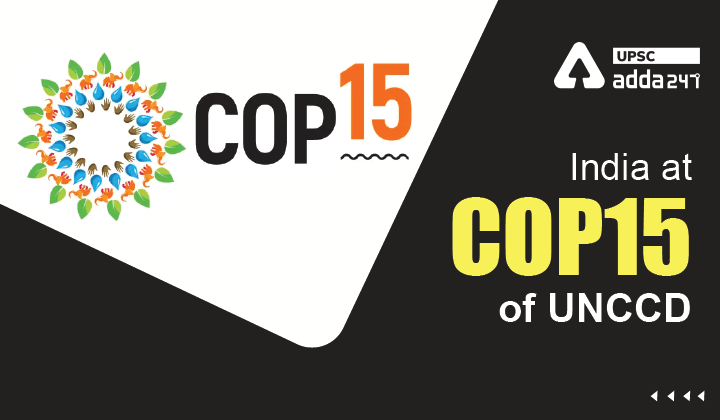Table of Contents
UNCCD COP15 UPSC: Relevance
- GS 3: Conservation, environmental pollution and degradation, environmental impact assessment.
UNCCD India UPSC: Context
- Recently, India has made statements regarding many thematic issues-Migration, Gender, Sand and Dust storms at the 15th Session of the Conference of Parties of United Nations Convention to Combat Desertification (UNCCD).
UNCCD COP 15: Key points on migration
- Key drivers of migration: Desertification, land degradation and drought (DLDD), climate and environmental changes.
- Promotion of sustainable agriculture and its associated value chains offer promising avenues to stop out-migration of rural population.
- A stronger symbiotic urban-rural linkage targeting vulnerable groups that include women, rural youth, refugees, and internally displaced person be provided with on-farm and off-farm employment.
- Watershed Development Component – Pradhan Mantri Krishi Sinchai Yojana (WDC-PMKSY) has generated more than 37.73 Million man-days of employment which also contributed to the reduction in migration in the treated areas, especially, during pandemic period.
- It has further acted as an enabler of reverse migration, when labour force was reverted to their native places and engaged with the watershed workforce.
UNCCD 2022: Key points on gender
- From the Fifth Five Year Plan (1974-78) onwards, there has been a marked shift in the approach to women’s issues from welfare to development.
- The National Commission for Women was set up by an Act of Parliament in 1990 to safeguard the rights and legal entitlements of women.
- The 73rd and 74th Amendments (1993) to the Constitution of India have provided for reservation of seats in the local bodies of Panchayats and Municipalities for women, laying a strong foundation for their participation in decision making at the local levels.
- The goal of National Policy for the Empowerment of Women, 2001 is to bring about the advancement, development and empowerment of women.
- Empowerment of women is an integral part of PMKSY in India.
- Representation of women has been envisioned in the Watershed Committees involved in planning, implementation and maintenance of watershed interventions.
- Women-based community organizations such as Self-Help Groups, User Groups and farmer producer organizations are formed and nurtured while implementing the watershed programs.
UNCCD India: Key points on dust storms
- Sand and dust storms (SDS) are of common occurrence in arid and semi-arid regions both in Asia and Africa and affects 11 of the 17 SDGs.
- SDS adversely impact environment and quality of life.
- Anthropogenic SDS source mitigation is lacking in most of the countries and there is a lack of required data and information to address SDS related issues.
- Capacity building of parties to address SDS through SDS toolbox and decision support system was envisaged. The first SDS Toolbox will be made available by mid-2022.
- India can designate appropriate remote sensing agency (such as SAC/ NRSC) to develop GIS layers at finer scale to integrate indicator layers to test its applicability on ground for further improvement.
Read current affairs for UPSC





 TSPSC Group 1 Question Paper 2024, Downl...
TSPSC Group 1 Question Paper 2024, Downl...
 TSPSC Group 1 Answer key 2024 Out, Downl...
TSPSC Group 1 Answer key 2024 Out, Downl...
 UPSC Prelims 2024 Question Paper, Downlo...
UPSC Prelims 2024 Question Paper, Downlo...





